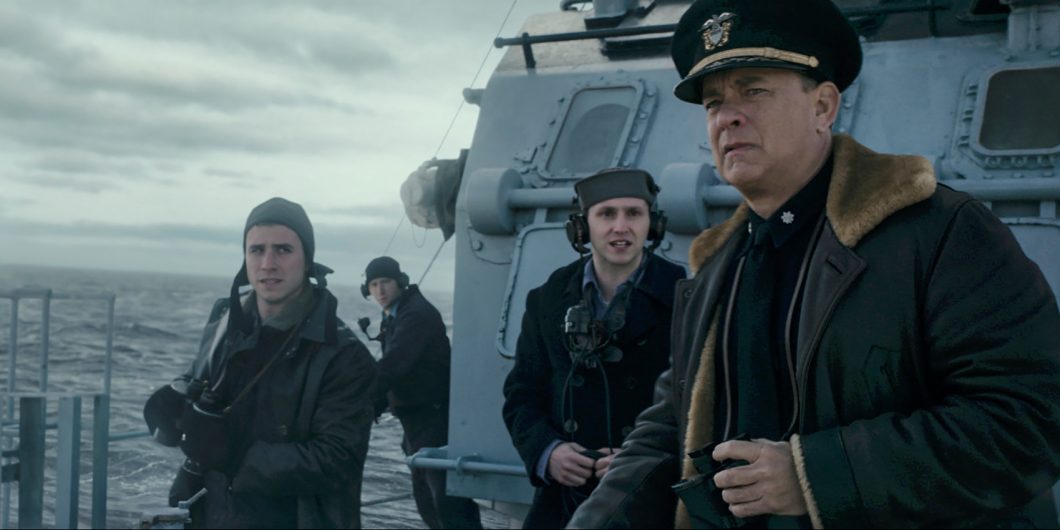Great men prove what we are capable of, but they also prove that institutions are not by themselves enough.
A Good Shepherd at War
We don’t make movies about faith these days, because faith is very uncomfortable. But now and then, it happens, and in 2020, the most famous Orthodox Christian in America, Tom Hanks, surprised everyone by writing and starring in Greyhound, a wonderful WWII drama about Christian faith. 2020 was a very bad year, bad for cinema, too, with terrible fallout for years to come—and this was the light of hope.
Christianity and Virtue
Tom Hanks plays a destroyer commander on convoy mission. It is his first command and he leads the escort for ships that are painfully defenseless, steaming from America to England in early 1942, soon after Pearl Harbor, in an effort to keep the British supplied and in the war.
But before we get to World War II, let’s look at the allegorical framework of the story. The danger in the story is the wolf pack, the German submarines—the devil in the deep. The hope is the air force, allied planes on the other side of the Atlantic—the angels, if you will. Our protagonist, captain of the USS Greyhound is stuck in-between, on the surface of the waters.
Nor is he merely a Christian soul sojourning in this world on his way to his reward—as a captain, he wields the powers of life and death. In a joking mood, he threatens to rain down hell on young sailors that get into a fight. With similar levity, he asks them to restore him to peace. Indeed, the C.S. Forster novel Hanks adapted is called The Good Shepherd, to emphasize the theme of leadership and rule.
Hanks is devoted equally to his job as a career officer in the Navy and his Christian faith. America going to war is therefore a double test to him. In the peacetime navy, Christianity makes a lot of sense—one lives by the rule of service and duty, without having to face horrors. Humility, furthermore, is very helpful, since prospects for promotion are scarce. This keeps a man from that darker side of his soul that asks him, how does he know what he’s worth if he’s never been tested?
The wartime navy is a very different proposition, not least because by 1942 England had been at war nearly three years, making this American captain worse than an innocent. All the preparation and experience of his career, which make him a competent commander, might mean nothing in a battle, when one’s every action is dictated by the enemy. But at least the prospect of sacrificing one’s life is Christian. John 13:15 says: Greater love hath no man than this, that a man lay down his life for his friends. Accordingly, we see a burial at sea, with the service read—the hope of resurrection and Christ’s judgment after the evils of this world come to an end.
But this admirable sacrificial love can neither foster nor preempt the necessity of killing enemies, and that, after all, is the necessary business of war. Hanks, however, cannot celebrate when he gets confirmation that he has sunk his first submarine—he worries about their souls instead. Nor does he want personal glory. For the navy to acknowledge his victory, he’d have to collect evidence of the sinking, which would take precious time. Instead, he puts duty first and hurries back to the convoy. This loyalty seems to have cost him his wife, perhaps because there’s not much private life left after so much service, but he is nevertheless loyal to her, too. One could be excused for considering him an incurable romantic when he declares his eternal love.
This intensity of feeling goes together with an ascetic self-control. Hanks neither sleeps nor eats during the period of utmost danger, the 48 hours in the Black Pit, when the convoy is devoid of aerial protection from either side of the ocean. He does keep drinking coffee, of course, but this asceticism gives a certain moral power to the allegory of angel and devil—this entire drama is about his soul being tested as much as about the safety of the fleet.
War
The destroyer Greyhound and the ships she protects are stalked by the Grey Wolf, leader of the half-dozen or so U-Boats aiming to sink the convoy. The submarine captain is as cruel as Hanks is mild, but they are both trained for war, and fighting over what the German captain calls a flock. He attempts to induce despair in the sailors of the convoy by transmitting menacing, bestial radio messages. Hanks accordingly has to order a change of frequency every time the Germans find the channel they use, that his young crew maintain the self-control necessary in a crisis. The entire tension of the movie, we may say, follows from this threat to our morality: Will the Grey Wolf make his threats realities? Will evil triumph?
Submarine warfare is terrifying because we are not water animals and we therefore are defenseless when it comes to the depths. This may have encouraged Hanks to think of the similarity with the passions of the soul, since we understand ourselves very little and are therefore vulnerable to terrible, unexpected suffering. But what makes submarine warfare especially devilish is the denial of any chance to the adversary in battle or any help after defeat. Germans, not a maritime people, were unquestionably the worst offenders when it came to drowning the defenseless, denying thereby any claim to common humanity, and they earned a special hatred for that reason. Greyhound does a very good job of portraying the vulnerability of the ships, the helplessness of the escort in many situations, and the fear and pity it evokes suggests the necessity of piety in face of such an enemy.
But of course, one needs knowledge of war also. Hanks as a captain is competent, but ordinary, which fits the situation of an escort destroyer—we’re not talking about one of the major battles of WWII, nor about any incident of remarkable martial prowess. This is a story about defending the economics and logistics of the Allied war effort. We know what America fought for in WWII, and everyone contributed in some way to the great victory, but here we see things at the level of the ordinary man who rushes into danger and yet, paradoxically, whose concern is to avoid fighting entirely, if possible.
This very unusual perspective does not preclude thrilling battle scenes, nor the dominant emotion of the film, fear. But it helps to raise questions about the necessary moral education of a fighting force, and the movie makes much of the gentleness with which Hanks treats his crew, for whose lives he feels responsible without feeling at the same time authorized to send them to their deaths. He leaves the harshness to his officers—he is only harsh to himself for his mistakes. They have all been trained to use their weapons and are willing to do it; he worries about what this does to the soul.
The movie draws our attention to fuel and ammunition instead—the tools by which the convoy lives or dies. As to fuel, Hanks does very well for his destroyer, but he loses the tanker on the convoy. As to ammunition, he sinks a U-Boat with his depth charges, but then wastes them and doesn’t keep track of his reserves. Circumstances run away with him and leave him nearly defenseless. This failure with regard to weaponry suggests a connection to mercy—he is insufficiently dedicated to the task of killing. After all, the type of ship is called a destroyer because it is intended to destroy torpedo-launching vessels.
Mercy gets him in trouble on another occasion, when he’s forced to choose between saving the survivors of an already sinking ship and going to the aid of another imminently threatened ship. Since he knows there are living men in the water, he stops his engines and stays to save them. This is philanthropy, love of human beings, but it is not what the art of war requires. As a matter of strategy, the ship should be a priority, since everything he’s doing is about serving a greater war effort, despite the cost to lives. But then a more troubling problem emerges, because mercy to the human beings in immediate peril means abandoning the others to a cruel fate. In this world, you cannot be merciful to everyone—everyone but a tyrant has far more love than power to protect.
C.S. Forester
All these actions reveal the soul of the captain and make the war story at the same time a reflection on the Christian contribution to WWII. Hanks has never written a story so concerned with piety and, indeed, I cannot remember the last time a large movie production portrayed the Christian faith with this combination of competence and decency. The story is itself told in such a way to avoid anything sordid, so as to show doing one’s duty in the best light. Perhaps its running length is part of this effort, too—at 90 minutes, it’s short for a contemporary movie—to avoid sentimentality and even protect the audience from dwelling too much on horror.
Perhaps we could use more such stories and so we should praise Hanks as a writer, not only as an actor. And we should also remember the novelist whose work he’s adapting. C.S. Forester was once famous as the author of the Horatio Hornblower series of adventure novels about the maritime Napoleonic Wars. The series was adapted to film both in old Hollywood, starring Gregory Peck, and more recently, in Britain, in the 90s, in a series of eight TV films which seem ideally suited for teenaged boys, since they’re about noble warriors in a just cause.
Forester also wrote The African Queen, which John Huston adapted into the famous Oscar-winning movie starring Humphrey Bogart and Katharine Hepburn. This is more than most novelists achieve and a good example of the point the story makes: It is not only great writers who achieve something worthwhile and who can help educate our passions. Hanks seems to have learned this lesson as well. One hopes conservatives also learn it, since we may take it as a certainty that Hollywood cannot. It will be up to us to rethink what cinema is and should be.



